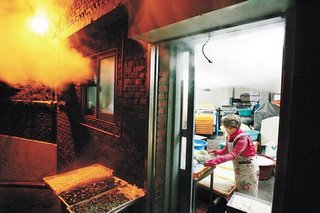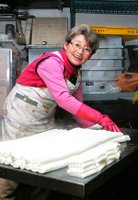jeong of the pangakan
| Just as I had finished writing elsewhere that the absence of the offspring of small shopkeepers in the shops has a lot to do with the fact that the businesses very rarely are thought of as something to be passed on, Chosun Ilbo has in its serial Salmat nanûn sesang ("life worth living" or "good world" or something like that) a feel-good story of a rice mill-bakery (pangakan) kept by a granny in her 60s, who is thinking of handing over the mill to her youngest son. He has not married, and has been helping her mother in the pangakan since he finished his military service. Ok, I'll take this only as an aberration from a general pattern... The article is a prime example of how certain Korean values like goodheartedness and human warmth (or whatever) or chông (jeong情) are associated with a non-modern environment, lack of urban development, and village-like human relations. Granny's rice mill is located in Buam-dong, Jongno-gu, which is behind the presidential mansion right under Bugak mountain. First paragraph: Buam-dong, Jongno-gu in Seoul. In this place called "the village behind the Blue House" everything takes place slowly. In the alleys lined by rice shops, barber shops, and Chinese restaurants the pace of the residents is not hurried, and grandmothers are enjoying the winter sunshine and chatting in front of the grocery store.   Update, Feb 1, 2006 Dram Man has good comments on the choice of the son to be involved in the business; I failed to think of the economical incentives that he points out. In fact, granny's business is apparently good: two thirds of her ttôk is sold to Gangnam people, and the several art galleries in the vicinity are her regulars (reappreciation of traditional ritual food). Categories at del.icio.us/hunjang: businesskeepers • neighborhood • Koreanculture |



Comments to note "jeong of the pangakan" (Comments to posts older than 14 days are moderated)
Not to be a fly in the ointment, but I can see why there may be a good reason for the son to be involoved outside of the "Jeong":
A. Real Estate, thats a pricey area. Even if Granny does not own the property, the gwaligum (goodwill, loosely translated) on a place like that is pretty large. Futher more an area like that, i think, has certian build restrictions, or may be considered "cultural area" which would also have a postive effect on either land value or gwaligum.
B. Business may well be very good, and there for atypical. Its an older area of Seoul. The area is also the subject of many a "secret good place" type glossy articles. This shop may have been among them (even more so considering they are on the Chosun's radar screen).
Write a Comment